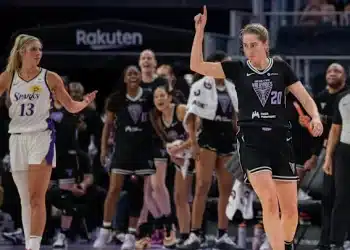By: Jeffrey Newholm
“I am grateful for the passion and commitment Jenny has demonstrated throughout her time with the Seattle Storm.” This is the recent seeming vote of confidence of Storm President Alisha Valvanis gave to three year head coach Jenny Boucek. And judging by Boucek’s consistent Tweeting of feel-good Agape Christianity, it may seem that Boucek had found a good fit in Seattle. However, the false stench of public relations being what it is, this quote is actually from a press release stating that Boucek had been fired (coinciding with voluminous silence from Boucek’s Twitter feed, making one wonder how sincere her commitment to the power of positive thinking really was). The professionalism of the manner or timing of the move (there’s still three weeks left in the regular season) aside, the writing was on the wall for Boucek-the team had failed to show improvement from 2016 despite a recent influx of young talent, while the clock is simultaneously ticking on Sue Bird’s career. While Boucek’s Tweets may have put a smile on fans’ faces, the truth is aggressive, borderline dictatorial styles of leadership have proven time and again to be the most effective methods of coaching. I can think of three counterexamples to Boucek’s (publically, anyways) steadfast commitment to gentleness and humility.
One doesn’t have to look very far for a foil to Boucek-a clear counterexample is Minnesota’s Cheryl Reeve. Reeve has amassed a 188-73 record for the Lynx, with three WNBA titles. Last year, one of the key plays in the Lynx’ game five Finals loss was a clearly missed call in favor of the LA Sparks. While Boucek would have looked like a hypocrite by crying foul, Reeve was quickly and firmly outspoken about the quality of league officiating, and rightfully so (it was hardly a new complaint; just a year earlier a blown call handed the Lynx a spot in the finals). As the United Way so helpfully puts it, “Nothing Changes If Nothing Changes”-without a powerful figure speaking out about an issue like this, the league would never be motivated to improve things. Earlier this year, Reeve continued her penchant to voice her mind clearly by speaking out on the lack of Minnesota media coverage of the WNBA All Star Game, where the Lynx’ own Maya Moore was MVP again. While many would argue that there are not a lot of things more boring in sports than an All Star Game-and I would certainly agree with this sentiment-I do appreciate Reeve’s effort to fight for gender equality in sports coverage, especially considering the Timberwolves’ long stretch of weak play. Quite frankly, I don’t think another Boucek retweet of Tim Keller Wisdom would have had nearly the same impact. Above all else, Reeve’s aggressive style of coaching has proved to be a very good fit for a roster filled with experienced players committed to total professionalism and an absolute commitment to winning.
When considering a list of greatest college coaches ever, there’s really no debate about the top two-Uconn’s Geno Aureiemma and the late Pat Summitt of Tennessee. Both coaches started with just about nothing-Summitt came from an era before Title IX, when there was a gross inequality in treatment between men’s and women’s athletic programs, while Geno inherited an awful and virtually ignored Connecticut program. The key to the success of both coaches was their high standards of excellence in practice and great favoritism of criticism over praise-while knowing when to give a compliment when genuinely earned. Diana Taurasi commented that Geno would spend the pre and regular season tearing his players down, and then spend the playoffs building them back up-a portion of the season Uconn has proven to be extremely successful in over the last two decades. When Candace Parker, in the immediate aftermath of the Sparks’ 2016 Finals victory over Minnesota, broke down in front of the cameras and chocked out “this one’s for Pat”, it was obvious how much of an impact Summitt had on the young women that came through her Vols program, every one of whom graduated. Off the court, the two coaches took different roads to the common goal of gender equality in sports-Summitt by taking small and gradual measures towards better treatment for her program, and Auriemma by being “unapologetically Geno” in his extremely blunt and direct demeanor towards every issue and public question (perhaps to the chagrin of many well-meaning reporters). The results? 19 nationals titles between the two, with a total of 1,098 wins for Summitt and soon over a thousand for Auriemma as well. The line between strictness and abuse in coaching may be perceived as being fine, but these two coaches proved that it can be walked successful for all parties involved.
In the 21st century NFL, there can be so much “coachspeak” that one must squint to read between the lines to find out what the coach really means, and as seen with the Storm, the genuine reason a coach is fired. In a world of increasing paranoia over saying anything controversial or “politically incorrect”, coaches like Reeve and Summitt help shine a light on what’s really wrong with their sports or society at large, and help motivate their players to commit to actually working towards solutions to these issues. So next time you see a coach yell or become a bit unruly, don’t be too quick to think, “what’s that guy’s problem?” Someone may be taking a stand for 100% effort from their players, which is never too much to ask. This may not make for the prettiest Tweet-but it’s been proven to make the best young man or woman.
Nathan’s WNBA Power Rankings Going into Week Two
By: Nathan Snell Two weeks into WNBA basketball, we have seen some exciting games so far. As a disclaimer, the...


 NFL
NFL





